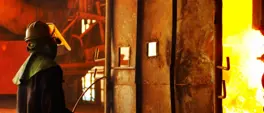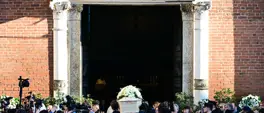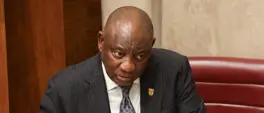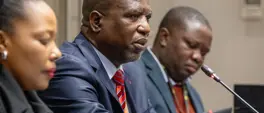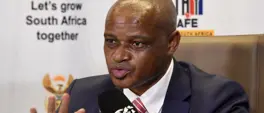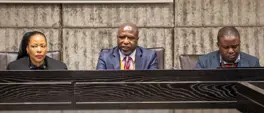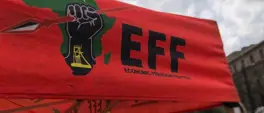MALAIKA MAHLATSI | Political speak as an instrument to abuse South Africans with endless dialogue
Malaika Mahlatsi
20 June 2025 | 12:15What are the people of Hammanskraal going to say about water security challenges that they have not been saying and protesting about since the mid 2000s?
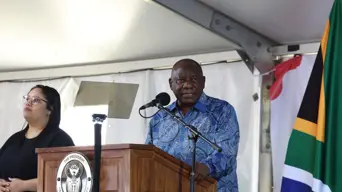
President Cyril Ramaphosa announces a National Dialogue for 2025. Image: @CyrilRamaphosa
“To the sound of cheers, democracy dies”.
English writer Giles Foden used these words in his seminal work, The Last King of Scotland. The novel, published in 1988, merges fact and fiction to depict the reign of Uganda’s former ruler, Idi Amin, who led the country during a military dictatorship that was responsible for the deaths of hundreds of thousands of Ugandan people.
The statement is used in the book to describe the public celebrations that were held across Uganda when Amin and the military deposed the then-president, Milton Obote, with whom Amin had once been very close. Obote's regime had been brutal to Ugandans and is best described by Phares Mukasa Mutibwa in Uganda Since Independence: A Story of Unfulfilled Hopes, a brilliant historical account of the devastation that has visited Uganda right from colonialism up to independence.
What makes the story of Uganda poignant and amplifies the sentiments of Foden is that the same people who celebrated the fall of Obote in 1971 and welcomed Amin would, in October of 1979, return to the streets to celebrate the fall of Amin. And just over a year later, in December 1980, the same people would re-elect Obote, the same man whose removal they had danced to. And Obote did not waste time reminding them who he was. By 1983, hundreds of thousands of Ugandans were dead, killed in the hands of Obote’s brutal military.
When the story of this era of Uganda’s brutal history is told, the coup d'états take centre stage. But there is another story, one more insidious, that begs for reflection – the story of Ugandans themselves, who lined the streets to cheer as they were being sent to the slaughter.
There are many explanations for their actions, some more significant than others. But one explanation that is not insignificant is that of the strength of manipulation that people can fall victim to, expressed through what we may call “political speak”. African politicians and military leaders, in particular, are masters of political speak.
Every brutal regime that has ever existed on the continent, from Liberia to Uganda, was built on a foundation of political speak. Politicians and military leaders appropriate revolutionary language, promising change and progress, to whip people into a frenzy.
They sell the idea of revolution to a people desperate for change, a people so debilitated that they have nothing else to hold onto but hope. Hope, in Africa, has been used as an albatross around our necks, and this works because hope is such a powerful tool. But, as The Architect tells Neo in The Matrix: “Hope, it is the quintessential human delusion, simultaneously the source of your greatest strength, and your greatest weakness”.
I provide this background as an anchor to my response to Anda Bici’s article titled “Dismissing the National Dialogue betrays our struggle legacy”, a response to my reflections on President Cyril Ramaphosa’s use of a National Dialogue to distract South Africans from the chronic failures of the democratic government to facilitate meaningful transformation.
Bici, in familiar political speak, summons the spirit of revolution to argue for the necessity of dialogue. He uses words like “social contract” and talks about the marginalised who are outside power structures. To read his article, one would think that he is defending a necessary dialogue that is being proposed in a country where the people have never and do not engage with the government in dialogue.
In reality, there are few countries in the world where the people are as vocal as South Africans are, and where they use dynamic instruments to engage with the government. From dialogues to protests, the media to the polls, South Africans across all walks of life are constantly engaging with the government.
Regardless of how convincing political speak from members and leaders of the African National Congress (ANC) may sound, the real truth is that the problem in South Africa is not the absence of dialogue, but the absence of political will to action dialogue. The extent of dialogue in our country is expressed in an article I wrote for the Sowetan this week, and I want to quote myself:
“Dialogues between the government and communities happen on an annual basis. In fact, they are a constitutional imperative. These dialogues take place in the form of Integrated Development Planning (IDP), which considers various factors like spatial planning, infrastructure, economic development, social development, and environmental management.
South African law mandates that all municipalities develop and regularly review their IDPs, ensuring alignment with national and provincial development plans. Beyond IDPs, all tiers of government host imbizos regularly. In the early 2000s, the Cabinet decided that imbizo, as a style of interactive governance and communication, should be adopted to promote increased dialogue between the government and people without mediation.
The President and Deputy President set aside days in their diaries several times a year to give concrete expression to the Imbizo programme through visits to provinces. The aim is to give people an opportunity to raise issues about the programmes of government.
This would, in the main, ensure that government listens to and notes the issues raised and ensures adequate follow-up with responsible departments and bodies, and where possible, responds immediately, if action has already been committed or taken”.
Beyond imbizos, the IDP process, and constituency dialogues that legislators facilitate on a consistent basis, there are also dialogues that are facilitated by political parties.
The ANC, for example, reserves Mondays as constituency days, which its own deployees in government must form part of. They are required to go to their constituency offices to deal with issues raised by communities across hundreds of wards in the country.
Government departments and entities also engage with communities through dialogues. The national Department of Social Development is especially dedicated to this. It engages with rural communities in the most remote parts of the country and beyond.
The department even engages with South Africans being held in foreign prisons, particularly mothers and youth in conflict with the law. This programme has been ongoing for years. But dialogues are not state-centric. Thousands of non-governmental organisations (NGOs), community-based organisations (CBOs), and other organisations are in constant dialogue with communities on the margins.
One only has to look at the work of Oxfam South Africa, which, under its former executive director, Lebogang Ramafoko, dedicated incalculable resources to dialoguing with and empowering rural women and underprivileged communities across peri-urban regions of our country.
Bici and proponents of the National Dialogue would have us believe that South Africa is afflicted with the absence of dialogue, that certain voices have been denied a platform to engage with the government.
Bici does not seem to appreciate the depth of the irony of his argument, which is that the same government he claims is being revolutionary in calling for a National Dialogue has, in fact, dedicated great resources to dialogues over many years. What are the rural women in Cofimvaba who have been engaging in community-level dialogues facilitated by the government itself going to say differently to the same government in the National Dialogue?
What are the people of Hammanskraal going to say about water security challenges that they have not been saying and protesting about since the mid-2000s?
What is my grandmother in Soweto whose electricity goes off for hours every day going to say at a National Dialogue that she has not said at community imbizos, street committee meetings, door-to-door visits that were conducted prior to the 2024 general election, door-to-door visits being conducted as we speak for the upcoming local government elections?
What am I going to say at a National Dialogue about the impact of infrastructure deterioration that I have not said in my academic research, the media (including in the ANC Today) and other platforms?
Is it a “social contract” when South Africans keep saying the same things on different platforms, to the same government, year in and year out, and are consistently disregarded? Where is the accountability, monitoring and evaluation part of the “social contract” in this debate around the National Dialogue? What has been done about the issues raised at the many dialogues and protests that take place in our country on a daily basis?
In Uganda, political speak was used to manipulate people into supporting regressive regimes that all came in with the promise of revolution. In South Africa, political speak is being used to manipulate people into thinking that participation alone is enough.
But it is not. South Africans participate in engagements with the government all the time, in different ways, on different platforms and mediums. If the government really cares about what South Africans think and feel, rather than subject us to yet another dialogue, it should dedicate the resources to collecting all (readily) available data of what we have been saying and what challenges we have been pointing to.
It should create master themes of submissions from these dialogues and then assess what developments have occurred and what needs work.
We need an evaluation of what data already exists before we begin another process of data collection in the same communities where the disregarded data was extracted. This is what a social contract is. This is what meaningful engagement is. Anything less is theatre and distraction.
Malaika, an award-winning bestselling author, is a geographer and researcher at the Institute for Pan African Thought and Conversation. She is a PhD in Geography candidate at the University of Bayreuth in Germany.
Get the whole picture 💡
Take a look at the topic timeline for all related articles.

